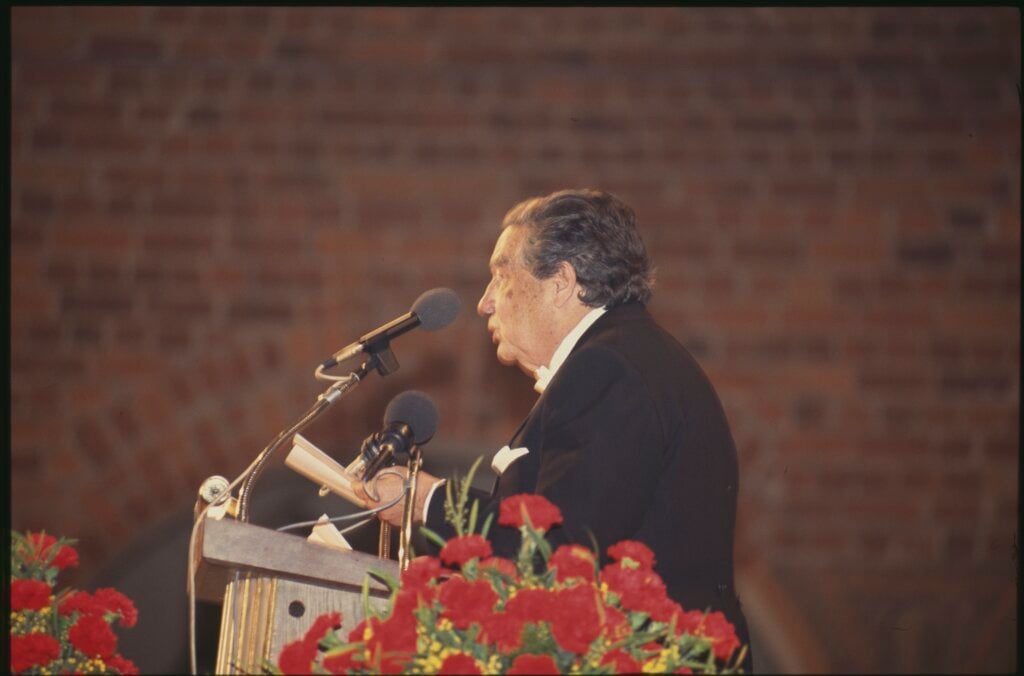Octavio Paz
Banquet speech

English
Spanish
Octavio Paz’ speech at the Nobel Banquet, December 10, 1990
(Translation)
Your Majesties, Ladies and Gentlemen,
I shall be brief – but, since time is elastic, I am afraid you are going to hear me for one hundred and eighty very long seconds.
We are witnessing not only the end of a century but the end of a historical period. What will arise from the collapse of ideology? Is this the dawn of an era of universal concord and freedom for all or will there be a resurgence of tribal idolatry and religious fanaticism, unleashing discord and tyranny? Will the powerful democracies that have achieved freedom and abundance become less selfish and show more understanding towards the deprived nations? Will the latter learn to distrust the preachers of doctrinaire violence who have led them to failure? And in my own part of the world, in Latin America, and especially in Mexico, my native land, will we finally achieve true modernity, which is not just political democracy, economic prosperity and social justice but also reconciliation with our tradition and with ourselves?
It is impossible to know. The recent past has taught us that no-one holds the keys to history. The century ends with a throng of questions. Yet we can be certain of one thing: life on our planet is endangered. Our unthinking cult of progress together with the very advances in our struggle to exploit nature have turned into a suicidal race. Just as we are beginning to unravel the secrets of the galaxies and the atomic particle, as we explore the enigmas of molecular biology and the origins of life, we have wounded the very heart of nature. This is why the most immediate and most urgent question is the survival of the environment, regardless of whatever forms of social and political organization nations may choose. The defence of nature is the defence of mankind.
At the close of this century we have discovered that we are part of a vast system (or network of systems) ranging from plants and animals to cells, molecules, atoms and stars. We are a link in “the great chain of being”, as the philosophers of antiquity used to call the universe. One of man’s oldest gestures, repeated daily from the beginning of time, is to look up and marvel at the starry sky. This act of contemplation frequently ends in a feeling of fraternal identification with the universe. In the countryside one night, years ago, as I contemplated the stars in the cloudless sky, I heard the metallic sound of the elytra of a cricket. There was a strange correspondence between the reverberation of the firmament at night and the music of the tiny insect. I wrote these lines:
The sky’s big.
Up there, worlds scatter.
Persistent,
unfazed by so much night,
a cricket: brace and bit.
Stars, hills, clouds, trees, birds, crickets, men: each has its world, each is a world, and yet all of these worlds correspond. We can only defend life if we experience a revival of this feeling of solidarity with nature. It is not impossible: fraternity is a word that belongs to the traditions of Liberalism and Socialism, of science and religion.
I raise my glass – another ancient gesture of fraternity – and drink to the health, happiness and prosperity of Your Majesties and to the great, noble and peace-loving people of Sweden.
Translated by Anthony Stanton.
Nobel Prizes and laureates
Six prizes were awarded for achievements that have conferred the greatest benefit to humankind. The 14 laureates' work and discoveries range from quantum tunnelling to promoting democratic rights.
See them all presented here.
